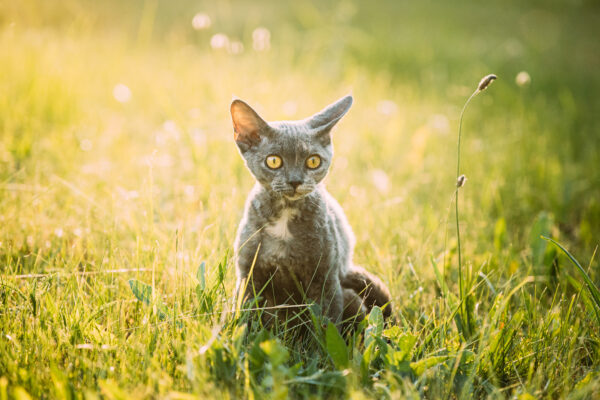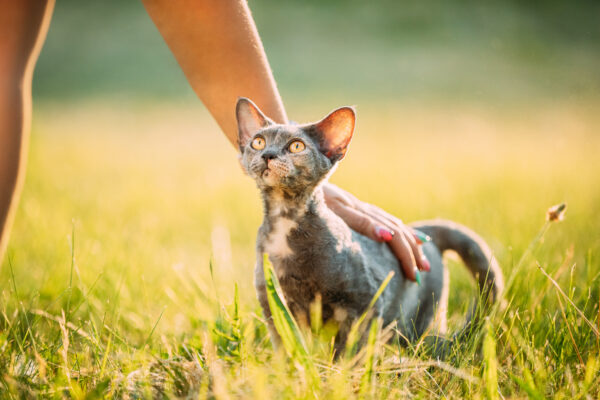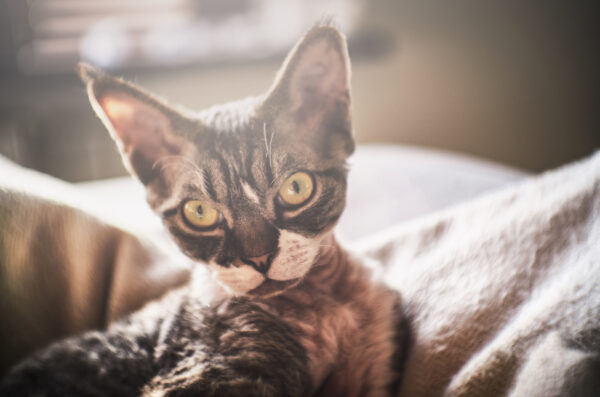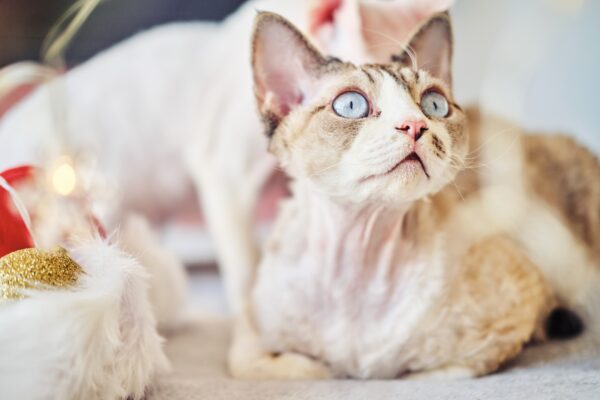p { font-size: 18px; }
The Devon Rex cat, with its enchanting curly coat and mischievous personality, is a breed that captivates the hearts of cat enthusiasts worldwide. This comprehensive guide delves into everything you need to know about the Devon Rex—from its intriguing history and unique physical characteristics to its playful temperament and specialized care requirements. Whether you’re a seasoned cat owner or considering your first feline companion, this guide offers valuable insights to help you understand, care for, and cherish this extraordinary breed.
Table of Contents
- 1. History and Origin of the Devon Rex Cat
- 2. Physical Characteristics
- 3. Personality and Temperament
- 4. Health and Lifespan
- 5. Care and Maintenance
- 6. Nutrition and Diet
- 7. Training and Socialization
- 8. Devon Rex Cats as Family Pets
- 9. Adoption and Breeding
- 10. Case Studies and Statistics
- 11. Comparison with Other Breeds
- 12. Frequently Asked Questions
- 13. Conclusion
1. History and Origin of the Devon Rex Cat

1.1 The Serendipitous Beginning
The Devon Rex breed originated in Devonshire, England, in 1960. A stray curly-coated tomcat, later named Kirlee, was discovered near an abandoned tin mine. Kirlee mated with a calico female, producing a litter that included a curly-haired kitten. Recognizing the uniqueness of this kitten, local cat fancier Miss Beryl Cox began a breeding program to preserve the mutation (Cat Fanciers’ Association, n.d.).
1.2 Establishing the Breed
Initially believed to be related to the Cornish Rex, breeders attempted to cross Kirlee with Cornish Rex cats but found that the curly coat was due to a different gene. This led to the recognition of the Devon Rex as a distinct breed. By the late 1960s, the breed was gaining popularity, and in 1979, it was officially recognized by the Cat Fanciers’ Association (CFA) (The International Cat Association, n.d.).
1.3 Global Recognition
The Devon Rex was introduced to the United States and other countries, where breeders continued to develop the breed. Today, it is recognized by all major cat associations and has a dedicated following of enthusiasts who adore its unique appearance and affectionate nature.
2. Physical Characteristics

2.1 Unique Curly Coat
The Devon Rex is renowned for its soft, wavy coat, which is the result of a genetic mutation affecting hair growth. Unlike the Cornish Rex, the Devon Rex’s coat includes all three types of hair: guard, awn, and down hairs, but they are fragile and prone to breakage, giving the coat a tousled, rippled appearance (Cornell Feline Health Center, n.d.).
2.2 Distinctive Facial Features
The Devon Rex has an elfin face with large, expressive eyes, high cheekbones, and a short muzzle. Their ears are exceptionally large, set low on the head, and often described as “bat-like,” contributing to their impish expression.
2.3 Athletic Body Structure
They possess a slender yet muscular body with long legs and a broad chest. Their hind legs are slightly longer than their front legs, aiding in their agility and jumping abilities.
2.4 Coat Colors and Patterns
The breed comes in a wide array of colors and patterns, including solid, tabby, tortoiseshell, calico, and pointed. All eye colors are acceptable and often correlate with coat color.
2.5 Size and Weight
Devon Rex cats are medium-sized, with males typically weighing between 7 to 9 pounds and females between 5 to 7 pounds. They have a delicate appearance but are surprisingly sturdy.
3. Personality and Temperament

3.1 Playful and Mischievous
Devon Rex cats are known for their playful, energetic nature. They are often compared to monkeys or pixies due to their mischievous antics. They enjoy climbing, jumping, and interactive play.
3.2 Affectionate and Social
These cats form strong bonds with their human companions and thrive on interaction. They are known to snuggle under blankets, perch on shoulders, and follow their owners around the house.
3.3 Intelligent and Curious
Their intelligence makes them quick learners who can be trained to perform tricks and commands. They enjoy mental stimulation and require activities that challenge their minds.
3.4 Vocalization
Devon Rex cats are moderately vocal, using a soft, chirping voice to communicate. They often “talk” to their owners, expressing themselves with a range of sounds.
4. Health and Lifespan

4.1 Common Health Issues
While generally healthy, Devon Rex cats are predisposed to certain health conditions:
- Hypertrophic Cardiomyopathy (HCM): A heart condition characterized by thickening of the heart muscle (Payne et al., 2010).
- Hereditary Myopathy: A muscle weakness condition affecting mobility.
- Hip Dysplasia: Abnormal development of the hip joint.
- Skin Conditions: Such as seborrhea and sensitivity due to their delicate coat.
4.2 Lifespan
The average lifespan of a Devon Rex cat ranges from 10 to 15 years, with many living beyond 15 years when provided with proper care and nutrition.
4.3 Preventative Health Care
Regular veterinary check-ups are essential for early detection of health issues. Annual screenings, including heart evaluations and muscle function tests, are recommended.
4.4 Genetic Testing
Responsible breeders conduct genetic testing to minimize the risk of hereditary diseases. When adopting a Devon Rex, inquire about the health history and any genetic tests performed.
5. Care and Maintenance
5.1 Grooming Needs
The Devon Rex’s delicate coat requires gentle care. Regular bathing may be necessary to remove excess oils from the skin, as their coat does not absorb oil like other breeds. Use a mild, cat-specific shampoo and avoid over-bathing to prevent skin dryness.
5.2 Nail and Dental Care
Trim their nails every two to three weeks and provide scratching posts to maintain claw health. Regular dental care, including brushing and dental treats, helps prevent periodontal disease.
5.3 Ear and Skin Care
Their large ears can accumulate wax and debris. Check and clean their ears weekly with a vet-approved ear cleaner. Monitor their skin for any signs of irritation or allergies.
5.4 Environmental Enrichment
Devon Rex cats are active and require stimulation. Provide climbing trees, perches, and interactive toys. Regular play sessions are important for their physical and mental well-being. For a selection of quality pet toys and accessories, visit Flawless Cuties.
5.5 Travel Considerations
If you travel frequently or plan to take your cat on trips, consider investing in travel essentials to ensure their comfort and safety.
6. Nutrition and Diet
6.1 Dietary Requirements
A high-quality, balanced diet rich in protein supports their active lifestyle. Essential nutrients include:
- Protein: For muscle development and energy.
- Taurine: Essential for heart and eye health.
- Omega Fatty Acids: Promote healthy skin and coat.
- Vitamins and Minerals: Support overall health and immune function.
6.2 Feeding Guidelines
Due to their high metabolism, Devon Rex cats may require more calories than other breeds. Divide their daily food allowance into multiple small meals to maintain energy levels.
6.3 Hydration
Ensure fresh water is always available. Some cats prefer running water; consider a pet water fountain to encourage hydration.
6.4 Special Dietary Considerations
Monitor for any food sensitivities or allergies, especially skin reactions. Consult your veterinarian for personalized dietary recommendations, particularly if your cat has specific health concerns.
7. Training and Socialization
7.1 Litter Box Training
Devon Rex cats are typically easy to litter train. Provide a clean, accessible litter box and maintain cleanliness to encourage consistent use.
7.2 Behavioral Training
Use positive reinforcement techniques to teach commands and discourage undesirable behaviors. Their intelligence and eagerness to interact make them responsive to training.
7.3 Socialization
Early socialization with different people, pets, and environments helps them become well-adjusted adults. They are naturally sociable and adapt well to new situations.
7.4 Enrichment Activities
Engage them with interactive toys, agility training, and puzzle feeders. Teaching them tricks can provide mental stimulation and strengthen your bond.
8. Devon Rex Cats as Family Pets
8.1 Compatibility with Children
Their playful and affectionate nature makes Devon Rex cats excellent companions for children. They enjoy interactive play and are patient with gentle handling.
8.2 Interaction with Other Pets
They generally get along well with other cats and cat-friendly dogs. Their sociable disposition makes them suitable for multi-pet households.
8.3 Adaptability to Living Environments
Devon Rex cats adapt well to various living situations, including apartments and houses. They are indoor cats but appreciate space to climb and explore.
8.4 Emotional Needs
They thrive on companionship and may become lonely if left alone for extended periods. Consider adopting a pair of Devon Rex cats or ensuring they have company during the day.
9. Adoption and Breeding
9.1 Choosing a Reputable Breeder
If purchasing from a breeder, ensure they adhere to ethical practices:
- Provide health clearances and genetic testing results.
- Allow you to visit their facility and meet the kittens’ parents.
- Offer a health guarantee and a return policy.
- Do not release kittens before 12 weeks of age.
Consult resources like TICA’s breeder directory for reputable breeders.
9.2 Adoption Opportunities
Consider adopting from shelters or rescue organizations. Many Devon Rex cats and mixes are in need of loving homes. Adoption fees often include vaccinations and spaying/neutering.
9.3 Ethical Considerations
Responsible breeding practices prioritize the health and welfare of the cats. Avoid breeders who:
- Cannot provide health documentation.
- Keep cats in poor conditions.
- Have multiple litters available at all times.
- Pressure you into a quick sale.
9.4 Spaying and Neutering
Spaying or neutering your cat is important to prevent unwanted litters and reduce the risk of certain health issues.
10. Case Studies and Statistics
10.1 Popularity Rankings
The Devon Rex is a unique breed that has gained a dedicated following. According to the Cat Fanciers’ Association, it ranks among the top 15 registered breeds (CFA, n.d.).
10.2 Health Studies
A study published in the Journal of Feline Medicine and Surgery highlighted the prevalence of hypertrophic cardiomyopathy in Devon Rex cats, emphasizing the importance of cardiac screenings (Styczynski et al., 2012).
10.3 Longevity Data
Data indicates that Devon Rex cats have a median lifespan of 14 years, with many living beyond 16 years when provided with proper care (O’Neill et al., 2015).
10.4 Behavioral Observations
Studies show that Devon Rex cats score high in sociability and activity levels, making them suitable for households seeking an interactive and engaging pet.
11. Comparison with Other Breeds
| Characteristic | Devon Rex | Cornish Rex | Sphynx |
|---|---|---|---|
| Origin | England | England | Canada |
| Coat Length | Short and Wavy | Short and Curly | Hairless (Fine Down) |
| Distinctive Features | Wavy Coat, Elfin Face | Curly Coat, Egg-shaped Head | Hairless, Wrinkled Skin |
| Personality | Playful, Mischievous | Active, Affectionate | Social, Energetic |
| Average Lifespan | 10-15 years | 12-16 years | 8-14 years |
| Activity Level | High | High | High |
| Grooming Needs | Moderate | Low | High (Skin Care) |
12. Frequently Asked Questions
Q1: Are Devon Rex cats hypoallergenic?
A: While no cat is completely hypoallergenic, Devon Rex cats may be better tolerated by some allergy sufferers due to their unique coat, which sheds less dander. However, they still produce allergens found in saliva and skin oils.
Q2: Do Devon Rex cats require special grooming?
A: Yes, their delicate coat and skin require gentle care. Regular baths may be needed to remove excess oils, and their large ears should be cleaned regularly.
Q3: How active are Devon Rex cats?
A: They are highly active and playful, requiring regular exercise and mental stimulation.
Q4: What is the cost of a Devon Rex kitten?
A: Prices vary depending on factors like pedigree and breeder reputation. Typically, Devon Rex kittens range from $800 to $1,500 USD. Always purchase from a reputable breeder.
Q5: Are Devon Rex cats good with children and other pets?
A: Yes, their friendly and sociable nature makes them excellent companions for children and other pets.
Q6: Do Devon Rex cats need protection from the sun?
A: Yes, due to their thin coat, they can be sensitive to sunlight and may be prone to sunburn. It’s important to protect them from excessive sun exposure.
Q7: Can Devon Rex cats be left alone during the day?
A: They prefer companionship and may become bored if left alone for long periods. Provide toys and consider a companion pet if you are frequently away.
Q8: Do Devon Rex cats get cold easily?
A: They may seek warmth due to their light coat. Providing cozy bedding and keeping your home at a comfortable temperature is important.
13. Conclusion
The Devon Rex cat is a breed that offers a unique blend of playful energy, affectionate companionship, and distinctive appearance. Their mischievous nature and loving personality make them a delightful addition to any household. By understanding their needs and providing proper care, you can ensure a happy, healthy life for your Devon Rex cat. For all your pet care needs, including premium toys, grooming supplies, and travel essentials tailored for your Devon Rex, visit Flawless Cuties, your trusted partner in pet care.
I Don’t Want to Hit My Dog, But I Want Them to Obey – What Should I Do? Here’s How to Train Your Dog PositivelyThe Best Homemade Dog Food Recipes: A Comprehensive GuideTop 10 Best Dog Breeds for Apartments: A Comprehensive GuideObedience Puppy Training: A Step-by-Step GuideCan I Pet That Dog? A Comprehensive Guide to Safe and Enjoyable Interactions
References
- Cat Fanciers’ Association. (n.d.). Devon Rex Breed Profile. Retrieved from https://cfa.org/devon-rex/
- Cornell Feline Health Center. (n.d.). Devon Rex Cat Breed. Retrieved from https://www.vet.cornell.edu/…/devon-rex-cat
- O’Neill, D. G., Church, D. B., McGreevy, P. D., Thomson, P. C., & Brodbelt, D. C. (2015). Longevity and mortality of cats attending primary care veterinary practices in England. Journal of Feline Medicine and Surgery, 17(2), 125-133. doi:10.1177/1098612X14536176
- Payne, J. R., Brodbelt, D. C., & Luis Fuentes, V. (2010). Cardiomyopathy prevalence in 780 apparently healthy cats in rehoming centres (the CatScan study). Journal of Veterinary Cardiology, 12(3), 155-162. doi:10.1016/j.jvc.2010.05.005
- PetMD. (n.d.). Devon Rex. Retrieved from https://www.petmd.com/cat/breeds/c_ct_devon_rex
- Styczynski, B., Meurs, K. M., Nguyenba, T. P., & Zimmerman, S. (2012). Hypertrophic cardiomyopathy in a Devon Rex cat. Journal of Feline Medicine and Surgery, 14(6), 474-477. doi:10.1177/1098612X12443402
- The International Cat Association (TICA). (n.d.). Devon Rex Breed. Retrieved from https://tica.org/devon-rex-breeders
























